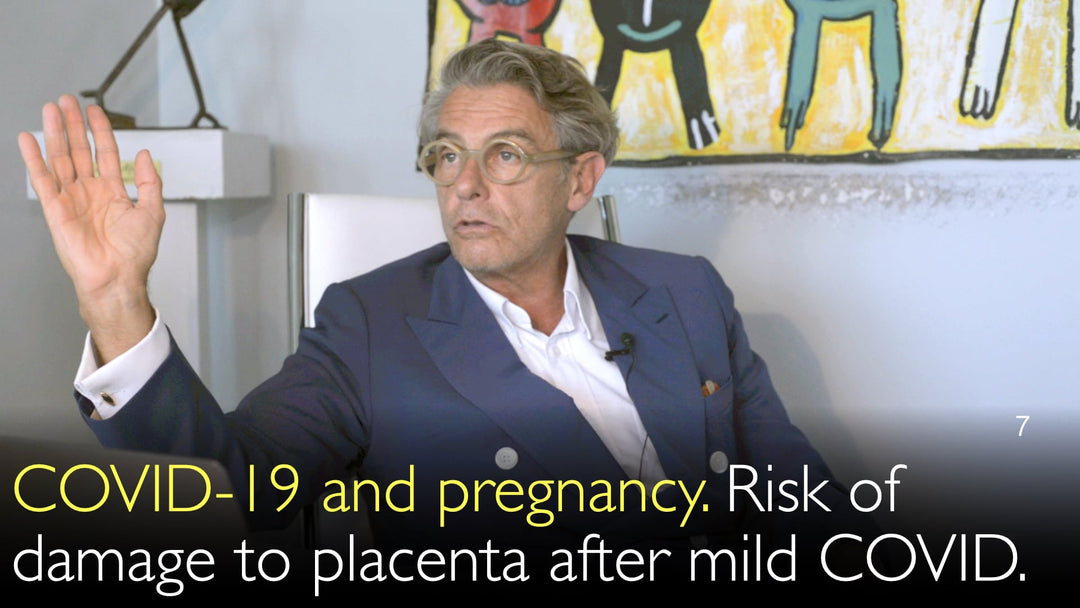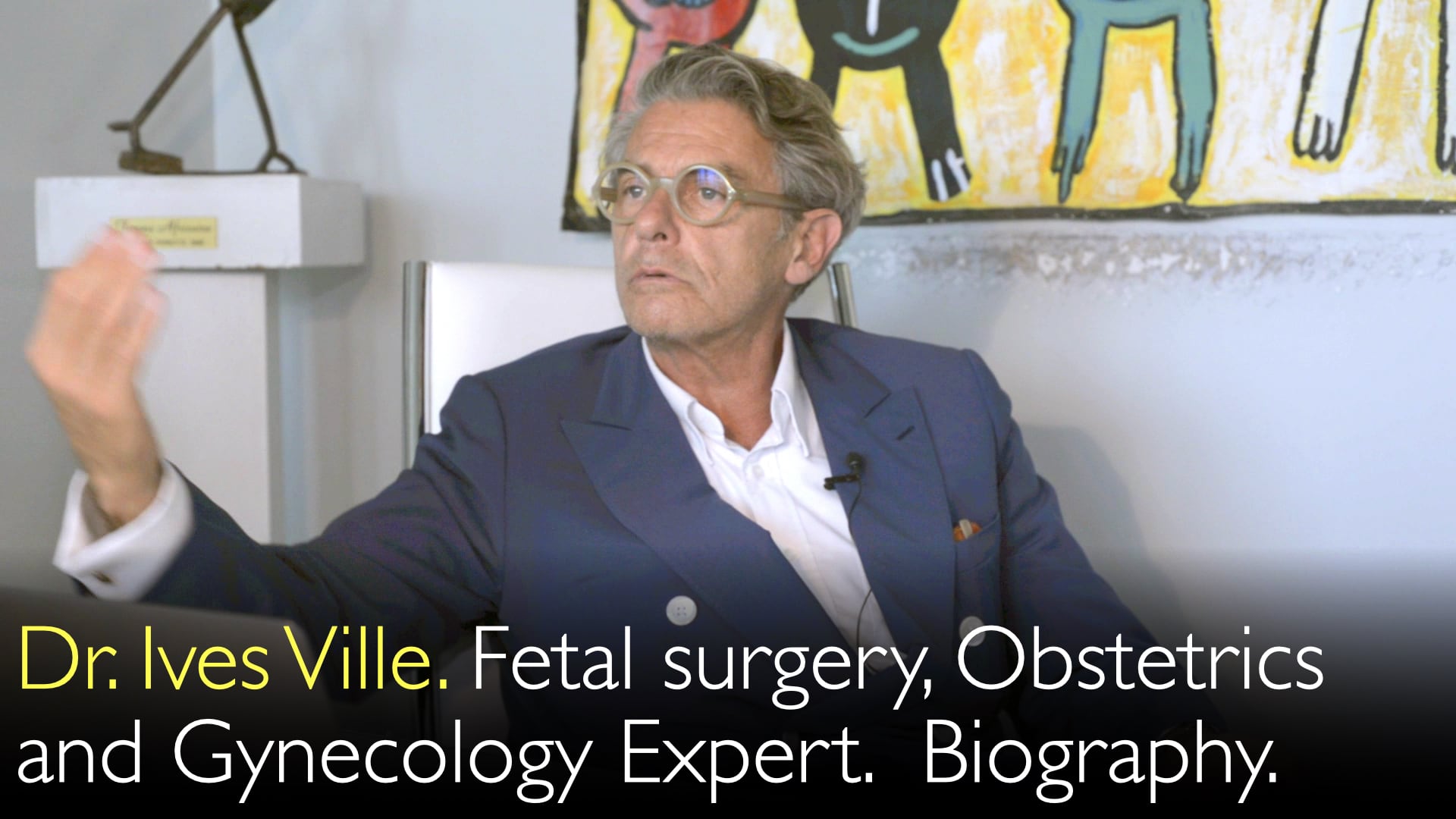Dr. Yves Ville, MD, en førende ekspert i moderskabs-føtal medicin, forklarer den afgørende betydning af COVID-19-vaccination under graviditet. Han påpeger, at selv milde COVID-19-infektioner, især med Delta-varianten, kan forårsage alvorlige skader på moderkagen, hvilket kan føre til intrauterin død eller akut fosterlidelse. Dr. Ville understreger, at vaccination ikke øger risikoen for spontan abort eller påvirker fertiliteten, og henviser til sikkerhedsdata fra over 35.000 vaccinerede gravide kvinder. Han anbefaler på det kraftigste, at gravide kvinder får vaccinen allerede i første trimester for at beskytte både sig selv og deres ufødte barn mod virusens skadelige virkning på moderkagen.
COVID-19 og graviditet: Placenta-risici, vaccinationssikkerhed og fosterbeskyttelse
Spring til afsnit
- COVID-19-vaccination under graviditet: Sikkerhed og hastværk
- Delta-varianten og alvorlig placentaskade
- SARS-CoV-2-receptorer i fosteret og placenta
- Overvågning og risici efter COVID-19 under graviditet
- Fertilitet og vaccination: Afmyter
- Fuld transskription
COVID-19-vaccination under graviditet: Sikkerhed og hastværk
Dr. Yves Ville, MD, understreger utvetydigt, at gravide kvinder bør vaccineres mod COVID-19. Han insisterer på, at de skal behandles som alle andre og ikke unddrages beskyttende tiltag. Vaccination anbefales på det kraftigste, også i første trimester. Dr. Ville henviser til omfattende sikkerhedsdata fra et amerikansk register med over 35.000 vaccinerede gravide, som ikke viser øget risiko for uønskede udfald. Den reelle fare, forklarer han, er at blive smittet med COVID-19, som udgør en betydelig trussel mod både moderen og det ufødte barn.
Delta-varianten og alvorlig placentaskade
En afgørende opdagelse, som Dr. Yves Ville, MD, drøfter, er den ekstreme toksicitet af Delta-varianten overfor placenta. Han rapporterer om intrauterin død og akut fosterlidelse i tredje trimester, selv efter milde infektioner hos moderen. Skaden viser sig et par uger efter den oprindelige infektion, hvor placenta er betydeligt ødelagt af virussen. Dette understreger en skræmmende realitet: en gravid kvinde med minimale symptomer kan stadig opleve en katastrofal placentahændelse, der truer graviditeten, hvilket gør forebyggelse gennem vaccination afgørende.
SARS-CoV-2-receptorer i fosteret og placenta
Dr. Villes forskning giver afgørende indsigt i, hvordan virussen forårsager skade. SARS-CoV-2-virussen binder sig til specifikke receptorer i kroppen. Hans team fandt disse receptorer til stede fra et meget tidligt stadium i placenta, samt i fosterets nyrer og tarm. Senere i graviditeten optræder receptorerne også i fosterets lunger. Dr. Yves Ville, MD, bemærker, at denne fordeling faktisk er betryggende med hensyn til risikoen for medfødte misdannelser, da disse organer sandsynligvis ikke bliver alvorligt beskadiget af virussen. Det primære mål er tydeligvis placenta, som er sårbar overfor ødelæggelse gennem hele graviditeten.
Overvågning og risici efter COVID-19 under graviditet
For kvinder, der bliver smittet med COVID-19 under graviditet, anbefaler Dr. Ville ekstremt omhyggelig opfølgning. Selv hvis moderen kommer sig godt, kan placenta være blevet svækket af virusinfektionen. Denne skade kan føre til nedsat foster vækst og en betydelig forhøjet risiko for fosterlidelse senere i graviditeten. Omhyggelig overvågning af fosterets vækst og velvære bliver en essentiel del af den prænatale pleje for at identificere eventuelle komplikationer tidligt. Dr. Anton Titov, MD, faciliterer denne vigtige drøftelse om håndtering af risici efter infektion.
Fertilitet og vaccination: Afmyter
Dr. Yves Ville, MD, adresserer direkte en vedvarende myte om, at COVID-19-vaccination kunne nedsætte fertiliteten. Han erklærer kategorisk, at der ikke er noget bevis—ikke engang en teoretisk basis—der understøtter denne påstand. Han karakteriserer sådanne bekymringer som "falske nyheder", defineret ved en fuldstændig mangel på understøttende beviser. Interviewet med Dr. Anton Titov, MD, fremhæver, at den eneste rationelle medicinske position er, at vaccination ikke påvirker en kvindes evne til at opnå graviditet. Denne klare vejledning er afgørende for at modvirke misinformation og opmuntre vaccination blandt dem, der planlægger familie.
Fuld transskription
Dr. Anton Titov, MD: En gravid kvinde kan blive smittet med COVID-19-virussen, men perinatal COVID-19-infektion under graviditet er ikke hyppig. Hvad er vigtigt at vide om COVID-19-infektioner og graviditet? Hvad er risikoen for medfødte misdannelser hos et ufødt barn på grund af COVID-19-infektion hos moderen?
Dr. Yves Ville, MD: Dette spørgsmål er aktuelt. Hvis du havde stillet det for kun otte måneder siden, ville svarene sandsynligvis have været anderledes. Nu er det vigtigt at insistere på, at gravide kvinder skal behandles som alle andre—ikke mindre behandlet, ikke mindre vurderet.
Der er ingen fordel i at forhindre eller udsætte kvinder for COVID-19-vaccinen. Gravide kvinder bør vaccineres mod COVID-19. Jo før, jo bedre. Vaccination i første trimester.
Gravide kvinder i verden er de individer, der bliver mindst godt passet på. Når en frisør ved, at en klient er gravid, ringer frisøren til obstetrikeren: "Kan jeg give hende hårfarve?" Ja, hvorfor ikke? Hun er gravid. En tandlæge spørger: "Kan jeg behandle en tand, mens hun er gravid?" Ja, det bør du hellere.
Gravide kvinder i første trimester er den slags mennesker, som man ikke bør interagere med. Hvorfor det? Fordi en gravid kvinde i første trimester har en risiko på en ud af fire for at miste graviditeten. Uanset hvad hun gør—hun åbner vinduerne og ånder bjergluft—har hun den samme risiko som ved at gå til frisøren, tandlægen og vaccination med COVID-19-vaccine.
COVID-19-vaccine øger ikke risikoen for noget som helst. Der er nu det største register fra USA: over 35.000 kvinder vaccineret på én gang mod COVID-19, og der er ikke øget risiko for noget. Så risikoen for den gravide kvinde er faktisk at få COVID-19.
Denne risiko er ikke kun for dig selv. Det kunne være meget alvorligt, hvis hun er langt fremskreden i graviditeten. Men med denne COVID-19-stamme, den seneste stamme, Delta-varianten, hvad vi har observeret, er ekstrem toksicitet overfor placenta.
Selv hos kvinder med mild COVID-19, et par uger senere, har vi set intrauterin død. Vi har set akut fosterlidelse i tredje trimester. Når man ser på placenta, er placenta væsentlig ødelagt af COVID-19-virussen.
Så der er meget større risiko ved ikke at blive vaccineret og få COVID end ikke. Folk bør være opmærksomme på, at med denne seneste Delta-stamme, vil den næste være endnu værre—forhåbentlig ikke. Selv hvis kvinden ikke er meget symptomatisk i sig selv, inden for to eller tre uger efter det, kan COVID-19 Delta-virussen have nået placenta på tidspunktet for den akutte infektion og gradvist ødelagt placenta.
Hvad vi har kigget på: vi har kigget på receptoren for SARS-CoV-2 i placenta, trofoblast i første trimester. Vi kiggede på organer fra prøver fra patologien, organer fra forskellige udviklingsstadier af fosteret. Receptoren for SARS-CoV-2 fandt vi kun i nyrerne, i tarmen og placenta.
Sent i graviditeten blev SARS-CoV-2-receptoren fundet i lungerne. Dette er for os meget betryggende med hensyn til misdannelsesrisiko, fordi disse er meget usandsynlige at blive ødelagt eller beskadiget af SARS-CoV-2-virussen.
Derimod har placenta SARS-CoV-2-receptorer fra meget tidligt af. Placenta kunne blive påvirket og ødelagt på ethvert tidspunkt. Så vaccination er svaret for gravide kvinder endnu mere end for mennesker, der ikke er gravide.
Hvis kvinder får SARS-CoV-2, kommer de sig. De bør være meget forsigtige med opfølgningen for foster vækst. Fordi hvis placenta bliver ramt af virussen og det ikke er dødeligt, kunne det påvirke foster vækst. Man bør være meget, meget opmærksom på risikoen for fosterlidelse.
Måske mens vi diskuterer graviditet og COVID-19 og vaccination, er der en vedvarende myte, der fortsat cirkulerer om, at COVID-19-vaccination før graviditet kunne påvirke en kvindes evne til at opnå graviditet i første omgang.
Karakteristika for den slags spørgsmål er karakteristika for falske nyheder. Når du får falske nyheder, er definitionen af det, at du ikke har noget svar. Ellers ville de ikke fremsætte det. Dette fremsættes, fordi der ikke er noget svar på det.
Der er ikke den mindste smule bevis—ikke det fjerneste bevis—for at COVID-19-vaccination kunne påvirke fertiliteten. Der er ikke den mindste smule bevis selv i de mest udførlige teorier. Så det simple svar er nej.
Men hvilken demonstration kan du bringe? Intet. Du kan ikke bringe nogen demonstration mod falske nyheder. Det er baseret på ingenting. Så naturligvis er der ikke noget rationelt svar på det.
Dr. Anton Titov, MD: Det er meget vigtigt at høre fra en rigtig ekspert, som du er eksperten.





